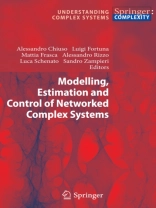The paradigm of complexity is pervading both science and engineering, le- ing to the emergence of novel approaches oriented at the development of a systemic view of the phenomena under study; the de?nition of powerful tools for modelling, estimation, and control; and the cross-fertilization of di?erent disciplines and approaches. One of the most promising paradigms to cope with complexity is that of networked systems. Complex, dynamical networks are powerful tools to model, estimate, and control many interesting phenomena, like agent coordination, synch- nization, social and economics events, networks of critical infrastructures, resourcesallocation, informationprocessing, controlovercommunicationn- works, etc. Advances in this ?eld are highlighting approaches that are more and more oftenbasedondynamicalandtime-varyingnetworks, i.e.networksconsisting of dynamical nodes with links that can change over time. Moreover, recent technological advances in wireless communication and decreasing cost and size of electronic devices are promoting the appearance of large inexpensive interconnected systems, each with computational, sensing and mobile ca- bilities. This is fostering the development of many engineering applications, which exploit the availability of these systems of systems to monitor and control very large-scale phenomena with ?ne resolution.
Alessandro Chiuso & Luigi Fortuna
Modelling, Estimation and Control of Networked Complex Systems [PDF ebook]
Modelling, Estimation and Control of Networked Complex Systems [PDF ebook]
ซื้อ eBook เล่มนี้และรับฟรีอีก 1 เล่ม!
ภาษา อังกฤษ ● รูป PDF ● ISBN 9783642031991 ● บรรณาธิการ Alessandro Chiuso & Luigi Fortuna ● สำนักพิมพ์ Springer Berlin Heidelberg ● การตีพิมพ์ 2009 ● ที่สามารถดาวน์โหลดได้ 3 ครั้ง ● เงินตรา EUR ● ID 2170891 ● ป้องกันการคัดลอก Adobe DRM
ต้องใช้เครื่องอ่านหนังสืออิเล็กทรอนิกส์ที่มีความสามารถ DRM












